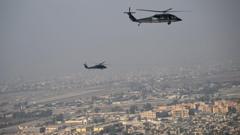In a recent interview, Syria's new President Ahmed al-Shara, a former rebel leader, emphasizes the need for U.S. sanctions to be lifted and hints at potential military partnerships with Russia and Turkey to stabilize the nation post-conflict.
### Syria's New Leadership: A Call for International Support

### Syria's New Leadership: A Call for International Support
President Ahmed al-Shara seeks to strengthen alliances and secure financial aid for a stable Syria following the civil war.
In April 2025, Ahmed al-Shara, the newly appointed president of Syria and former leader of a rebel coalition, expressed his urgent need for international support to stabilize the country plunged into chaos after a decade-long civil war. Having previously governed a small, rebel-held territory in the northwestern region of Syria, al-Shara maintained a straightforward alliance with Turkey while viewing the Assad regime and Iran as adversaries.
However, his current role brings newfound complexity as he must navigate a tougher geopolitical landscape. With the overthrow of President Bashar al-Assad, al-Shara's administration now depends on crucial foreign alliances to navigate the looming threats of economic collapse and further civil unrest.
In an exclusive interview with The New York Times, al-Shara outlined his administration's primary needs: persuading Western powers, particularly the U.S., to remove economic sanctions tied to his jihadist past, acquiring military aid necessary for establishing a new Syrian army, and securing foreign investment to prevent governmental dysfunction.
"We must highlight that instability in Syria doesn't only concern us but poses a risk to the entire Middle East and beyond,” al-Shara stated, signifying a shift from seeking mere support to demanding cooperation from global powers. As he seeks to rejuvenate Syria's economy and maintain peace, the former rebel leader faces the monumental task of redefining his administration's image on the world stage, while simultaneously trying to secure safety for his people against the backdrop of a history riddled with conflict.
However, his current role brings newfound complexity as he must navigate a tougher geopolitical landscape. With the overthrow of President Bashar al-Assad, al-Shara's administration now depends on crucial foreign alliances to navigate the looming threats of economic collapse and further civil unrest.
In an exclusive interview with The New York Times, al-Shara outlined his administration's primary needs: persuading Western powers, particularly the U.S., to remove economic sanctions tied to his jihadist past, acquiring military aid necessary for establishing a new Syrian army, and securing foreign investment to prevent governmental dysfunction.
"We must highlight that instability in Syria doesn't only concern us but poses a risk to the entire Middle East and beyond,” al-Shara stated, signifying a shift from seeking mere support to demanding cooperation from global powers. As he seeks to rejuvenate Syria's economy and maintain peace, the former rebel leader faces the monumental task of redefining his administration's image on the world stage, while simultaneously trying to secure safety for his people against the backdrop of a history riddled with conflict.





















